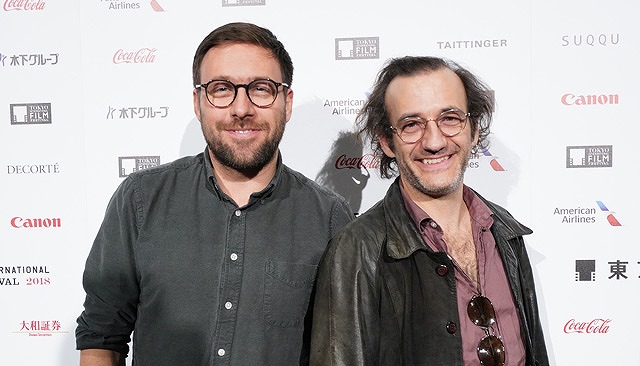
A French-Canadian Tramp Navigates an American Nightmare
Director Maxime Giroux and lead actor Martin Dubreuil fielded questions from the press following the international premiere of their suspense film, The Great Darkened Days, on November 1. The film is playing in the 31st TIFF Competition section.
Europe is in the midst of a nameless war. Quebecois hobo Philippe (Dubreuil) is dodging his country’s draft, surviving by winning Charlie Chaplin-impersonation contests in small southwest American towns. After being robbed, he is forced to roam the barren wilderness for shelter, but the population has turned twisted thanks to its fascistic leader. Philippe’s encounters reveal an America that is itself thirsty for violence, from a cruel war widow who keeps a woman as a “dog,” to a sadistic contrabandist and human trafficker with an appetite for torture.
Though the narrative is not given a time or place, many elements – from the period setting details to the stark landscape to the square aspect ratio of the film – place the story in the 1940s. “We actually used a 1.37:1 aspect ratio, and not the current standard aspect ratio of 1.33:1,” explained Giroux at the press conference. “This was the aspect ratio used in all of Chaplin’s films.”
The film begins with Chaplin’s famous speech in The Great Dictator, another film that links the tramp to fascism and whose themes have striking relevance even today. “We made this film because we think the world is going to hell,” said an impassioned Giroux. “Chaplin made that almost 70 years ago, and we are still struggling with the same things.”
Giroux said the film was a passion project and escape from “what many would consider the worst kind of work,” selling products. “Chaplin made that speech on freedom and tolerance, but he was also at the center of Hollywood, making a lot of money,” he said. “He was a representative of capitalism himself, feeding the beast. I relate to that because I do a lot of TV commercials for work, so I’m feeding the beast myself.”
Historically, many in Quebec escaped to America to dodge draft obligations, and Giroux saw parallels with the war and Canadian attitudes towards filmmaking. “Many in Quebec currently feel that making it in Hollywood or making films in the English language is the dream, but at some point they want to come back home,” he said. “So the character in the film is also a metaphor for what is happening in Quebec, which is this globalization, but it’s all in English.”
The role had special relevance for Dubreuil, as his own grandfather was a draft dodger. “He would hide in the roof of his mother’s apartment every time the army came to get him,” he said. “They eventually caught him and enlisted him, but he ran away so many times that they just let him go.”
When asked by Giroux to play the part of a Chaplin-like hobo, Dubreuil said it was a dream come true as a physical actor, but was also told this was not a historical film and he wasn’t actually playing Chaplin in real life. “I really like and admire Chaplin, so it was a challenge,” he said. “The guy I’m playing is not Chaplin; he’s just dodging the war and probably hasn’t seen any Chaplin movies. So I didn’t watch any Chaplin movies to prepare for the role myself.”
Giroux and Dubreuil have worked together on many different short and feature films over a 20-year period. “It would be impossible to do this film without this guy,” exclaimed Giroux. “If he wasn’t available, I wouldn’t have even tried. It was such a physically demanding job – we only had twelve crew members running around in the cold – and without this guy, this film would not exist.”
Dubreuil said the experience on the film was significant as he was able to achieve a better understanding with his long-time collaborator. “I’ve gotten on Maxime’s nerves asking so many questions about the characters,” he said, “but I learned this time to not have to ask so many questions and when to leave him alone. It’s hard for a director to have his head in so many directions, and I was able to let him do his thing.”
“We’re like an old couple,” responded Giroux. “We hate each other and love each other, and I like when we suffer together on the movie set.”
“He had the key,” responded Dubreuil, in reference to a scene where his character is handcuffed by his tormenters. “He had one key in his pocket to unlock my handcuffs, and I often asked, ‘But when is he coming?’”